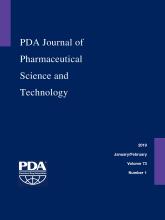Abstract
Lyophilization is a commonly used and often preferred method for preparing certain drug products. In this process, the liquid pharmaceutical product is packaged in glass vials, frozen, and then dried via sublimation at low pressures. One problem that can be encountered during lyophilization is the occasional failure of the glass vial, a condition that will be referred to in this paper as “lyo-breakage.” Lyo-breakage, while relatively rare, can be a serious problem, as it results in lost product, additional costs to remediate any spillage, and inspection time to ensure that all broken vials are discarded. Some companies have suggested that lyo-breakage is related to thermal stress and, subsequently, can be reduced through changes to the thermal properties of the vials. In this paper, we will show that when the most common form of lyo-breakage occurs, the stresses in the glass are caused by an internal force from product expansion during freezing and not due to thermal stress from processing temperatures.
LAY ABSTRACT: Lyophilization, or freeze drying, is often the preferred method for preparing certain drug products following manufacture. In this process, the liquid pharmaceutical product is packaged in a small glass cylindrical container called a vial, frozen, and then dried at low pressures. One problem that can be encountered during lyophilization is the occasional failure of the glass vial. While relatively rare, this failure can result in lost drug product, additional costs to clean up any spillage, and increased inspection time to ensure that all broken vials are discarded. The data presented in this paper demonstrate that when the most common form of lyophilization-associated breakage occurs, the stresses in the glass are caused by an internal force from drug product expansion during freezing and not due to thermal stress on the glass from processing temperatures.
- © PDA, Inc. 2019
PDA members receive access to all articles published in the current year and previous volume year. Institutional subscribers received access to all content. Log in below to receive access to this article if you are either of these.
If you are neither or you are a PDA member trying to access an article outside of your membership license, then you must purchase access to this article (below). If you do not have a username or password for JPST, you will be required to create an account prior to purchasing.
Full issue PDFs are for PDA members only.
Note to pda.org users
The PDA and PDA bookstore websites (www.pda.org and www.pda.org/bookstore) are separate websites from the PDA JPST website. When you first join PDA, your initial UserID and Password are sent to HighWirePress to create your PDA JPST account. Subsequent UserrID and Password changes required at the PDA websites will not pass on to PDA JPST and vice versa. If you forget your PDA JPST UserID and/or Password, you can request help to retrieve UserID and reset Password below.






